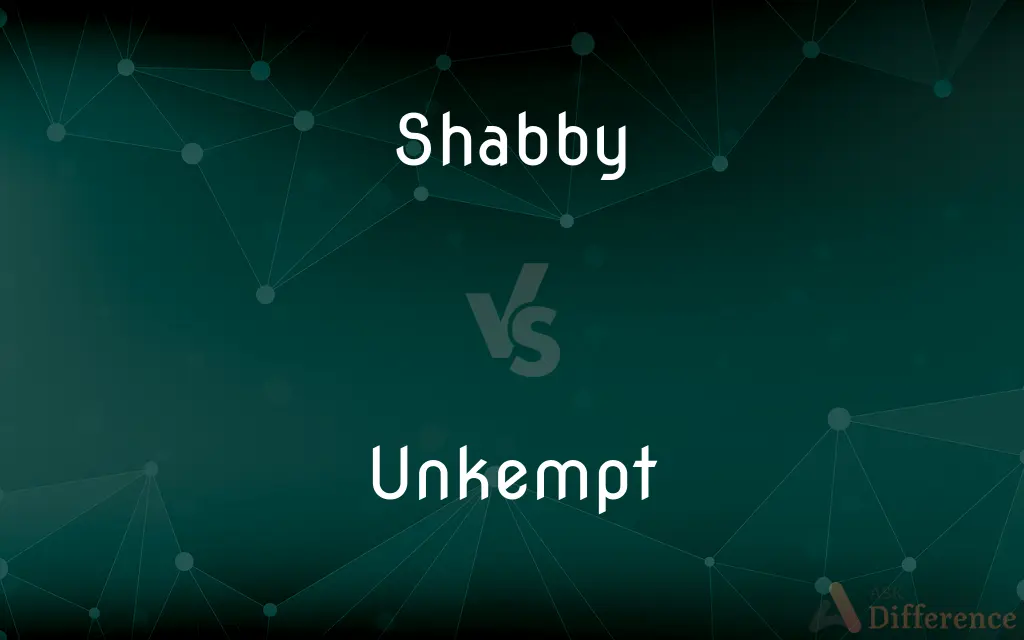Shabby vs. Unkempt — What's the Difference?
Edited by Tayyaba Rehman — By Maham Liaqat — Updated on May 3, 2024
Shabby describes items worn out or aged, typically concerning appearance, while unkempt refers to a person's messy or neglected state.

Difference Between Shabby and Unkempt
Table of Contents
ADVERTISEMENT
Key Differences
Shabby often relates to objects like clothing or furniture showing signs of wear and deterioration, whereas unkempt usually describes a person's appearance, indicating a lack of grooming or neatness.
While shabby implies material degradation over time, such as faded fabric or peeling paint, unkempt suggests a temporary state that could be remedied with personal care, like combing hair or ironing clothes.
Shabby can evoke a sense of vintage or rustic charm when applied deliberately in fashion or decor, on the other hand, unkempt nearly always carries a negative connotation, reflecting poor hygiene or carelessness.
In terms of value, shabby items may still be cherished or valuable, especially if antique, whereas unkempt often diminishes the perceived value or appeal of a person or place.
Shabby chic is a popular style that embraces a worn look to achieve a nostalgic aesthetic, while there is no equivalent celebrated style for being unkempt, as it generally lacks aesthetic intention.
ADVERTISEMENT
Comparison Chart
Focus
Objects like clothes, furniture
Personal appearance
Connotation
Often negative, sometimes nostalgic
Generally negative
Implication of time
Long-term wear and tear
Short-term neglect or lack of care
Potential for positivity
Yes, in styles like shabby chic
Rarely, if ever positive
Related to cleanliness
Not directly, more about condition
Directly relates to cleanliness and grooming
Compare with Definitions
Shabby
Embracing an aesthetic of stylish decay.
Her shabby chic living room was elegantly outmoded.
Unkempt
Associated with a lack of grooming.
Her unkempt appearance was frowned upon at the formal gathering.
Shabby
Inferior in quality.
Shabby treatment of the guests did not go unnoticed.
Unkempt
Neglected in appearance; messy.
He looked unkempt after working all night.
Shabby
Worn out from age or use.
The shabby sofa had faded under years of sunlight.
Unkempt
Not combed; usually referring to hair or appearance.
His unkempt hair gave him a wild look.
Shabby
Appearing old and tired.
He wore a shabby coat that had seen better days.
Unkempt
Lacking order or neatness.
The unkempt garden was overrun with weeds.
Shabby
Marked by a lack of maintenance.
The hotel's shabby hallways needed a fresh coat of paint.
Unkempt
Indicative of neglect.
The unkempt room showed signs of hasty abandonment.
Shabby
Showing signs of wear and tear; threadbare or worn-out
Shabby furniture.
Unkempt
(especially of a person) having an untidy or dishevelled appearance
They were unwashed and unkempt
Shabby
Dilapidated or deteriorated in condition, especially through neglect; seedy
A shabby little park.
Unkempt
Not combed
Unkempt hair.
Shabby
Wearing threadbare clothing.
Unkempt
Disorderly or untidy in appearance
An unkempt vagabond.
An unkempt garden.
Shabby
Despicable; mean
A shabby trick.
Unkempt
(of hair) Uncombed; dishevelled.
Shabby
Not generous or just; unfair
Shabby treatment.
Unkempt
(by extension) Disorderly; untidy; messy; not kept up.
Unkempt bedroom
Shabby
Of mediocre or substandard quality.
Unkempt
(figurative) Rough; unpolished
Shabby
(of clothing) Torn or worn; unkempt.
They lived in a tiny apartment, with some old, shabby furniture.
Unkempt
Not combed; disheveled; as, an urchin with unkempt hair.
Shabby
(of a person) Wearing ragged, very worn, or dirty clothing.
The fellow arrived looking rather shabby after journeying so far.
Unkempt
Fig.; Not smoothed; unpolished; rough.
My rhymes be rugged and unkempt.
Shabby
Mean; despicable.
Shabby treatment
Unkempt
Not neatly combed;
Wild unkempt hair
Shabby
Poor; showing little effort or talent.
His painting is not too shabby.
Unkempt
Not neat or cared for; slovenly;
His unkempt appearance
Shabby
Torn or worn to rage; poor; mean; ragged.
Wearing shabby coats and dirty shirts.
Unkempt
Not properly maintained;
An unkempt garden
Native vistas and unkempt rambling paths
Shabby
Clothed with ragged, much worn, or soiled garments.
Shabby
Mean; paltry; despicable; as, shabby treatment.
Shabby
Showing signs of wear and tear;
A ratty old overcoat
Shabby furniture
An old house with dirty windows and tatty curtains
Shabby
Mean and unworthy and despicable;
Shabby treatment
Common Curiosities
What does shabby mean in fashion?
In fashion, shabby often refers to a deliberately worn style that evokes nostalgia or vintage charm.
How can one avoid an unkempt appearance?
Regular grooming, proper attire, and general personal care can prevent an unkempt appearance.
What is the main difference between shabby and unkempt?
Shabby describes the condition of objects, showing wear and tear, while unkempt refers to a person’s messy or neglected appearance.
What's the best way to describe a shabby book?
A shabby book might have a worn cover, faded pages, and a well-loved look.
Can a place look unkempt?
Yes, places can appear unkempt if they are poorly maintained or cluttered.
Is unkempt a temporary condition?
Yes, unkempt usually indicates a temporary lack of care that can be remedied.
Is being shabby always a bad thing?
Not necessarily; the term can carry a positive connotation, especially in styles like shabby chic.
Can furniture be described as unkempt?
Unkempt typically describes personal appearance and grooming, not inanimate objects like furniture.
Does shabby imply old age?
Shabby implies that something has become deteriorated from age or use.
Can unkempt be used to describe someone’s home?
Yes, if the home is disordered or poorly maintained, it can be described as unkempt.
Share Your Discovery

Previous Comparison
Innovative vs. Innovatory
Next Comparison
Candy vs. ConfectionAuthor Spotlight
Written by
Maham LiaqatEdited by
Tayyaba RehmanTayyaba Rehman is a distinguished writer, currently serving as a primary contributor to askdifference.com. As a researcher in semantics and etymology, Tayyaba's passion for the complexity of languages and their distinctions has found a perfect home on the platform. Tayyaba delves into the intricacies of language, distinguishing between commonly confused words and phrases, thereby providing clarity for readers worldwide.
















































